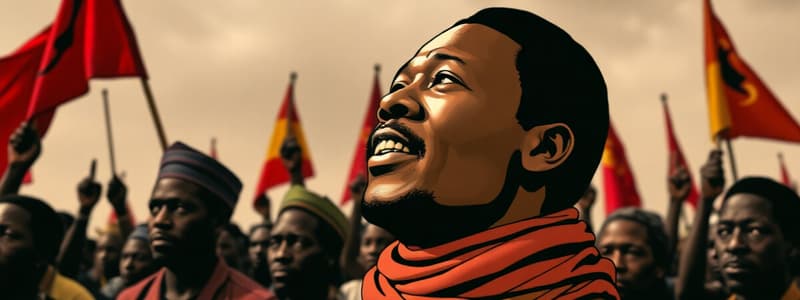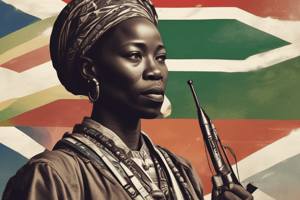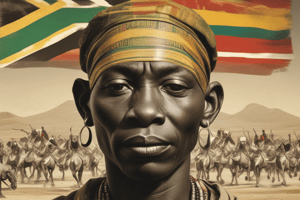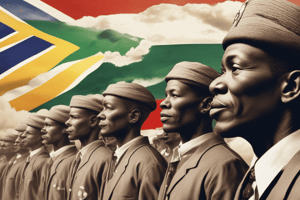Podcast
Questions and Answers
What was one of the original aims of the African Political Organization (APO)?
What was one of the original aims of the African Political Organization (APO)?
- Encouraging armed resistance against the government
- Establishing a separate nation for Coloureds
- Promoting Victorian integrity and abstinence (correct)
- Advocating for equal voting rights for all races
Which event represented a collective protest against the Whiteness of constitutional discussions in South Africa?
Which event represented a collective protest against the Whiteness of constitutional discussions in South Africa?
- The founding of the African Political Organization
- The passing of the South Africa Act
- The formation of the Union of South Africa
- The South African Native Convention (SANC) (correct)
Which body lobbied for the rights of Coloureds in South Africa from its founding in 1902 until the early 1940s?
Which body lobbied for the rights of Coloureds in South Africa from its founding in 1902 until the early 1940s?
- The South African Native Congress
- The Coloured Peoples Organization
- The African Political Organization (APO) (correct)
- The African National Congress (ANC)
What was the outcome of the delegation sent to London by the South African Native Convention (SANC)?
What was the outcome of the delegation sent to London by the South African Native Convention (SANC)?
What was a significant impact of the African Political Organization despite its eventual collapse?
What was a significant impact of the African Political Organization despite its eventual collapse?
Which of the following groups protested against the constitutional discussions that were exclusive to Whites?
Which of the following groups protested against the constitutional discussions that were exclusive to Whites?
What significant legislation was passed in 1910 that granted dominion to the White minority?
What significant legislation was passed in 1910 that granted dominion to the White minority?
What key social objective did the African Political Organization promote among Coloureds?
What key social objective did the African Political Organization promote among Coloureds?
Which factor contributed to the eventual decline of the African Political Organization?
Which factor contributed to the eventual decline of the African Political Organization?
What was a significant outcome of the Defiance Campaign among black South Africans?
What was a significant outcome of the Defiance Campaign among black South Africans?
What milestone did the Congress of the People (COP) achieve in 1955?
What milestone did the Congress of the People (COP) achieve in 1955?
What principle did the Freedom Charter promote?
What principle did the Freedom Charter promote?
Who led the breakaway faction that formed the Pan Africanist Congress (PAC) in 1959?
Who led the breakaway faction that formed the Pan Africanist Congress (PAC) in 1959?
What did Lilian Ngoyi imply about her political awakening?
What did Lilian Ngoyi imply about her political awakening?
What was a key reason some African nationalists rejected the Freedom Charter?
What was a key reason some African nationalists rejected the Freedom Charter?
How did the Defiance Campaign impact the Apartheid government?
How did the Defiance Campaign impact the Apartheid government?
In what way did the COP represent a change in resistance policies?
In what way did the COP represent a change in resistance policies?
What was a primary outcome of World War II for Africans?
What was a primary outcome of World War II for Africans?
What was the SANNC's main action against the Land Act?
What was the SANNC's main action against the Land Act?
What did the Atlantic Charter promise regarding people's government choices?
What did the Atlantic Charter promise regarding people's government choices?
Which of the following was a key realization for Africans in World War II?
Which of the following was a key realization for Africans in World War II?
How did the Atlantic Charter affect South Africans politically?
How did the Atlantic Charter affect South Africans politically?
What common question emerged from the Atlantic Charter regarding colonialism?
What common question emerged from the Atlantic Charter regarding colonialism?
Which aspect of the Land Act restricted black South Africans?
Which aspect of the Land Act restricted black South Africans?
What significant outcome did World War II have on African political movements?
What significant outcome did World War II have on African political movements?
Flashcards
Land Segregation
Land Segregation
Black people were restricted to specific areas; not allowed to own land outside those areas. White people were in other areas.
Land Act Challenges
Land Act Challenges
The SANNC challenged the Land Act; sent petitions; unsuccessful.
WWII Impact on Africa
WWII Impact on Africa
WWII strengthened African nationalism; encouraged fighting for freedom; led to decolonization of Africa.
African Soldiers in WWII
African Soldiers in WWII
Signup and view all the flashcards
Atlantic Charter
Atlantic Charter
Signup and view all the flashcards
Political Awareness Post-WWII
Political Awareness Post-WWII
Signup and view all the flashcards
African Nationalism
African Nationalism
Signup and view all the flashcards
South African Discrimination
South African Discrimination
Signup and view all the flashcards
Defiance Campaign
Defiance Campaign
Signup and view all the flashcards
Congress of the People (COP)
Congress of the People (COP)
Signup and view all the flashcards
Freedom Charter
Freedom Charter
Signup and view all the flashcards
Multiracialism
Multiracialism
Signup and view all the flashcards
Pan Africanist Congress (PAC)
Pan Africanist Congress (PAC)
Signup and view all the flashcards
Apartheid
Apartheid
Signup and view all the flashcards
Freedom Charter's Importance
Freedom Charter's Importance
Signup and view all the flashcards
Lionel Bernstein
Lionel Bernstein
Signup and view all the flashcards
Imvo Zabantsundu
Imvo Zabantsundu
Signup and view all the flashcards
African Political Organization (APO)
African Political Organization (APO)
Signup and view all the flashcards
South African Native Convention (SANC)
South African Native Convention (SANC)
Signup and view all the flashcards
Union of South Africa
Union of South Africa
Signup and view all the flashcards
Constitutional discussions (Union)
Constitutional discussions (Union)
Signup and view all the flashcards
South Africa Act
South Africa Act
Signup and view all the flashcards
John Dube
John Dube
Signup and view all the flashcards
African political thought and culture
African political thought and culture
Signup and view all the flashcards
Study Notes
Introduction
- African nationalism emerged as a response to colonial rule and the desire for self-determination.
- It evolved from local settings to the concept of Pan-Africanism, advocating for a unified Africa.
The Birth of African Political Consciousness
- African nationalism coincided with the political awakening of South Africa's black majority during the Mineral Revolution.
- The migrant labor system exploited African workers in the gold fields, depriving them of political rights.
- By the late 19th century, indigenous South Africans lost much of their political and economic independence.
- Harsh taxes and reduced wages were imposed, alongside encouragement of Chinese immigration to weaken African resistance among mineworkers.
- Mission-educated black elites, like John Tengo Jabavu, took the lead in advocating for the political rights of the black population.
John Jabavu
- Jabavu founded Imvo Zabantsundu, one of the first African newspapers, to voice political opinions and share views.
- The newspaper played a vital role in reflecting the lives and aspirations of Africans.
- Before Imvo Zabantsundu, missionary journals were the only African-language newspapers focused on literacy/Christianity and ignoring cultural issues.
The African Political Organisation (APO)
- The APO, founded in Cape Town in 1902, became a significant organization advocating for Coloured rights.
- Early objectives included emphasizing "civilizing" methods, advocating for unity among Coloureds, opposing discriminatory legislation and defending their social, political, and economic rights.
- Though influential for decades, the APO collapsed in the 1940s, giving way to more radical groups.
Union of South Africa
- Discussion towards the Union of South Africa took place between 1908 and 1909.
- African, coloured, and Indian communities protested against the exclusion from the constitutional discussions.
- A delegation led by William Schreiner was sent to London to persuade the British government against the proposed Union.
- Their efforts failed, and the Union of South Africa Act was passed in 1910.
The South African Natives National Congress (SANNC)
- The SANNC formed in 1912 to advocate for equal rights for Black South Africans.
- Composed of prominent black citizens, advocating for racial equality and equal treatment under the law..
- The meeting was the first of its kind, bringing together numerous black representatives, marking a significant step towards united Black action.
The 1913 Native Land Act
- The 1913 Native Land Act reserved a small percentage of land for Black communities.
- This limited their access to land ownership and forced them to reside in designated areas
- The SANNC challenged the Act, but their petition to British government and parliament proved unsuccessful.
World War II
- World War II significantly influenced African political aspiration for independence.
- Fighting in the war, Africans contributed to the decolonization efforts.
- The war highlighted the hypocrisy in claiming "freedom" for one while suppressing another.
The Atlantic Charter, 1941, and its Influence
- The Atlantic Charter, with its emphasis on self-determination of peoples, sparked debate and political consciousness amongst African communities in South Africa.
- The charter raised awareness amongst African communities concerning their own desires and rights.
African National Congress Youth League (ANCYL) and the Freedom Charter
- The formation of the ANC Youth League (ANCYL) emphasized African nationalism over racial unity.
- The Freedom Charter, adopted at the Congress of the People in 1955, marked a significant step towards a more assertive call for black political participation.
- Its ideology aimed for a multiracial South Africa through shared beliefs, not race.
The Formation of the Pan Africanist Congress (PAC)
- Disagreement over the inclusion of other racial groups in the Freedom Charter led to the formation of the Pan Africanist Congress (PAC) in 1959.
- The PAC emerged under the leadership of Robert Sobukwe with ideology focused on African nationalism and independence.
Studying That Suits You
Use AI to generate personalized quizzes and flashcards to suit your learning preferences.




